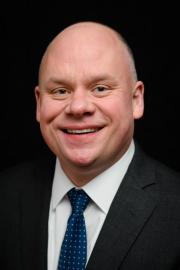Don Byron got his first taste of derivatives markets 25 years ago as a runner at the Chicago Board of Trade, carrying order information to the appropriate trading destination. And though his current job duties are decidedly more sophisticated, one thing remains the same -- a focus on execution, accuracy and efficiency.
Don joined FIA in August 2019 as head of global industry operations and execution, tasked with developing and implementing solutions related to clearing operations, execution technology, cybersecurity and market structure issues. With deep industry experience, including senior roles at Fidessa and Barclays, he knows firsthand the practical challenges facing modern derivatives markets.
MarketVoice sat down with Don to discuss some of the high-tech challenges facing the industry, and what challenges he plans to tackle on behalf of FIA's members in 2020.
MV: Your formal title is "head of global Industry operations and execution." What exactly does that entail?
DB: It's admittedly hard to sum up succinctly, but at industry events I tell people that as part of its overall mission, FIA works on the market structure issues that are fundamental to ensuring derivatives markets function properly. For my role, that means working with our members to build consensus on solutions that lead to more efficient clearing and trade management, execution technology and market access for all participants. At times each firm has its own priorities based on their business needs. But my job at FIA is to work in the interest of the system itself. Simply put, I work with FIA's members to make sure modern cleared derivatives markets are as safe, efficient and accessible as possible from an execution, operational and technology perspective.
MV: So what are the priorities or challenges you are looking at right now?
DB: One of the biggest challenges is simply finding the right forum and the right focus for this work. As I said, operational priorities can be wide-ranging based on who you ask. So I've been looking closely at FIA's global committees to ensure we have the right structure, the right people and the right priorities in place with clear goals and measurable objectives.
Another practical challenge is striking the right balance with members. I'm incredibly lucky that people across the industry have helped me get up to speed quickly, but they all obviously have day jobs -- so it's up to me to ensure committee members are used efficiently and effectively. FIA works for its members, not the other way around.
MV: Does that mean your work thus far has been mostly foundational, setting the stage for what's next?
DB: To a degree, yes. There's a certain amount of housekeeping in any role like this. But my entire career before FIA was in the private sector, managing people and products, so it's in my nature to focus on tangible goals. And one area where we've already made progress is in making FIA the primary source for information sharing within the industry.
For instance, in November we held a Q&A webinar in conjunction with FIA Tech and CME Group to help market participants understand the impact of CME making Tag 1031, the execution source code developed by FIA and FIA Tech, a mandatory value when submitting orders.
We are also working on a bigger project related to information sharing that involves the creation of a market disruption “playbook” -- a document that will be a vital resource for the industry in times of crisis.
MV: Other than the playbook, what other areas will be your focus in 2020?
DB: I will continue to focus on some of the previously mentioned foundational work across our committees, such as promoting global collaboration on initiatives that are not region specific and leveraging the resources of FIA to facilitate committee management. That will allow committee members to focus more on industry issues and not things like meeting logistics.
Also, while my areas of focus for 2020 are still coming together, there are a couple that are already on the agenda. One of those focus areas is going to be on data normalization as it relates to position portability. There is concern that the lack of industry standardized porting arrangements across CCPs could lead to position porting issues in the event of a default.
Another area of focus for me will be on cybersecurity and cyber resilience. For a variety of reasons, increasingly sophisticated cyberattacks pose a unique threat to our industry, particularly when it comes to the interconnectedness of our ecosystem from an operational and technology perspective.
MV: Talk a little more about your industry experience. How has it helped prepare you for this job at FIA, and how will it help you tackle those priorities?
So while I'm focused on the work, I always try to remember who we're doing it for. There's a whole next generation of leaders out there with great ideas but also some big risks ahead of them. It's my job at FIA to make sure they are set up for success in 2020, 2030 and beyond.


